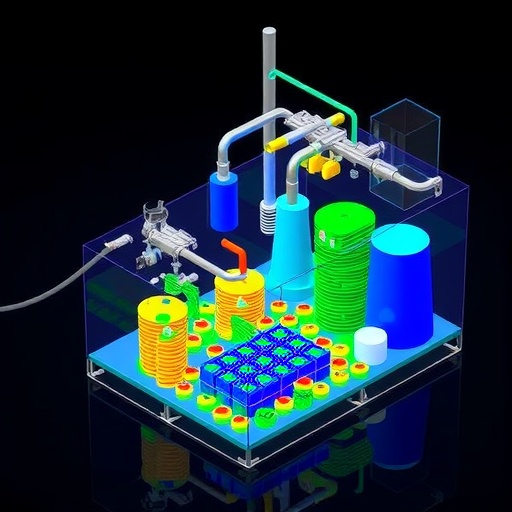In an era where waste management is becoming increasingly crucial for sustainable living, a groundbreaking study led by Nejadsadeghi, Yousefi, and Ghasemi presents a fresh perspective on the intersection of perceived benefits, source separation behavior, and the economics of waste management. Their research utilizes Monte Carlo simulation, a sophisticated statistical technique, to assess how public perception influences waste segregation practices and the subsequent economic implications in contemporary waste management systems.
Understanding the drivers behind source separation behavior is essential for developing effective waste management strategies. Traditional approaches often overlook the importance of perceived benefits. By shifting the focus towards what individuals find rewarding in the context of waste management, researchers can identify strategies that motivate greater participation in recycling and waste segregation initiatives. This study delves deeply into the psychological and economic factors that shape individuals’ attitudes towards waste management.
Monte Carlo simulation serves as a powerful tool in this analysis. By generating a multitude of possible outcomes based on varying scenarios, the research allows for a nuanced understanding of how perceived benefits can influence source separation behavior. The study employs this technique to model different waste management scenarios and to evaluate how changes in public perception can lead to significant differences in waste management outcomes.
The findings reveal that individuals who see tangible benefits from source separation are more likely to engage in sustainable behaviors. This perceived advantage might manifest in various forms, including financial incentives, community recognition, or environmental impact. The study highlights the necessity for stakeholders, including municipal authorities and waste management companies, to communicate these benefits effectively to enhance public participation.
Economic factors also play a pivotal role in shaping source separation behavior. The research explores the relationship between the costs associated with waste management and the public’s willingness to engage in source separation. When individuals comprehend the economic advantages of recycling—such as reduced landfill costs or savings on municipal waste collection services—they are more inclined to participate actively in waste segregation practices.
In addition, the paper discusses the significance of targeted communication strategies. By employing data-driven insights from the Monte Carlo simulations, decision-makers can tailor campaigns that resonate with specific demographics. Understanding the unique motivations of different community segments enables the design of initiatives that maximize participation rates in recycling programs.
The study also underscores the importance of education in waste management practices. Without a clear understanding of the benefits tied to source separation, public engagement tends to dwindle. The authors argue that educational campaigns should focus not only on the environmental ramifications of waste management but also on the financial and social benefits that can be derived from proper waste segregation.
Interventions that encourage source separation behavior are also pivotal in closing the loop on waste management economics. The research emphasizes that when communities actively participate in recycling efforts, the overall costs associated with waste disposal decrease. This reduction can be reinvested into further environmental initiatives, creating a feedback loop that benefits both the local economy and the planet.
Moreover, the implications of this research extend beyond local communities. The findings can inform national and international waste management policies, promoting a shift towards more sustainable practices worldwide. Policymakers can leverage the insights gained from this study to design frameworks that incentivize recycling and encourage behaviors aligned with environmental sustainability.
The study further contrasts various socio-economic backgrounds and their impact on perception and behavior. It reveals that income levels, education, and community engagement significantly influence how benefits are perceived and, consequently, how individuals participate in waste management practices. Tailoring waste management initiatives to address these disparities could lead to more equitable and effective outcomes.
As urban centers grow, the challenges of managing waste become increasingly complex. This research serves as a timely reminder that addressing these challenges requires a comprehensive understanding of human behavior. By intertwining economic analysis with psychological insights, the study provides a robust framework for developing innovative waste management solutions that resonate with diverse populations.
Nejadsadeghi and colleagues advocate for an integrative approach in waste management that harnesses the power of perceived benefits. The study argues that aligning economic incentives with individual motivations can transform the landscape of waste segregation, leading to increased participation and ultimately, more sustainable communities.
In conclusion, the research sheds light on the intricate relationship between perceived benefits and source separation behavior within the context of waste management economics. By harnessing the capabilities of Monte Carlo simulation, the authors provide a compelling case for re-evaluating how communities are engaged in waste management practices. This pioneering work stands to influence future policies and practices, ultimately guiding societies towards a more sustainable future.
Furthermore, the study opens up avenues for future research, particularly concerning the long-term impacts of education and awareness-raising campaigns on source separation behavior. Understanding how changes in individual perception evolve over time could provide invaluable insights for continuously improving waste management strategies.
In a world grappling with the consequences of waste accumulation and environmental degradation, the research by Nejadsadeghi, Yousefi, and Ghasemi is not only timely but imperative. By focusing on the perceived benefits that drive human behavior, this study illuminates a path forward for sustainable waste management, one where economic and environmental considerations go hand in hand.
Subject of Research: The interplay of perceived benefits, source separation behavior, and waste management economics.
Article Title: Assessment of linking perceived benefits to source separation behavior and waste management economics by Monte Carlo simulation.
Article References:
Nejadsadeghi, E., Yousefi, M., Ghasemi, A. et al. Assessment of linking perceived benefits to source separation behavior and waste management economics by Monte Carlo simulation.
Discov Sustain 6, 1052 (2025). https://doi.org/10.1007/s43621-025-01939-7
Image Credits: AI Generated
DOI:
Keywords: Waste Management, Source Separation, Monte Carlo Simulation, Perceived Benefits, Economic Incentives, Recycling Behavior, Environmental Sustainability, Public Participation.




